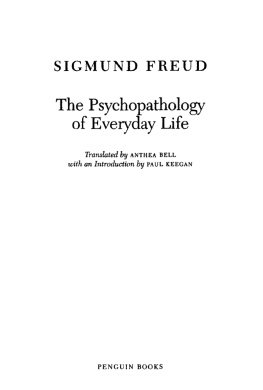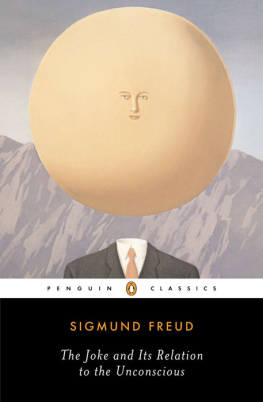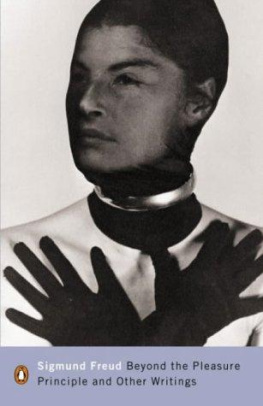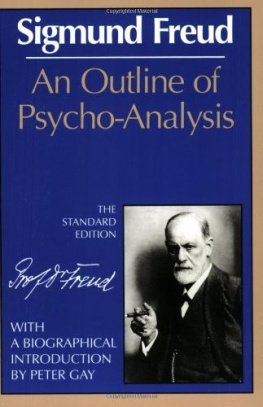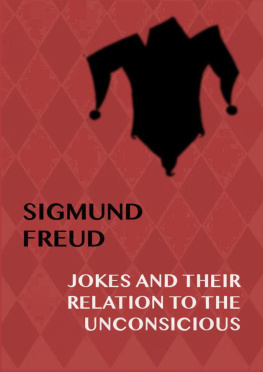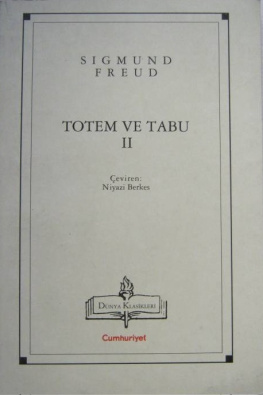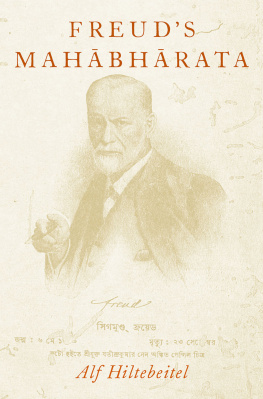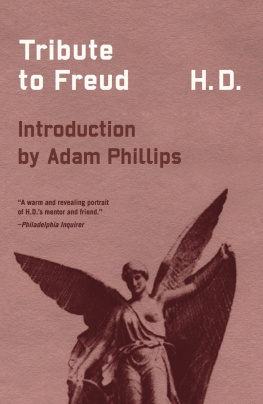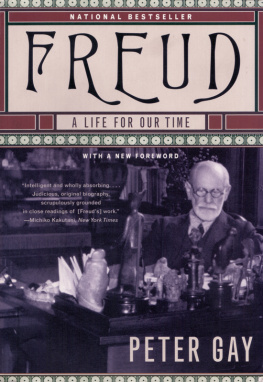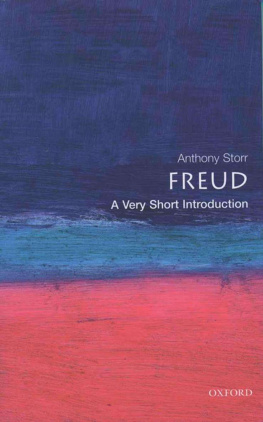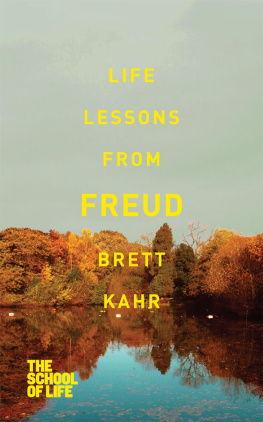Sigmund Freud - The Unconscious
Here you can read online Sigmund Freud - The Unconscious full text of the book (entire story) in english for free. Download pdf and epub, get meaning, cover and reviews about this ebook. year: 2005, publisher: Penguin Classics, genre: Religion. Description of the work, (preface) as well as reviews are available. Best literature library LitArk.com created for fans of good reading and offers a wide selection of genres:
Romance novel
Science fiction
Adventure
Detective
Science
History
Home and family
Prose
Art
Politics
Computer
Non-fiction
Religion
Business
Children
Humor
Choose a favorite category and find really read worthwhile books. Enjoy immersion in the world of imagination, feel the emotions of the characters or learn something new for yourself, make an fascinating discovery.

- Book:The Unconscious
- Author:
- Publisher:Penguin Classics
- Genre:
- Year:2005
- Rating:4 / 5
- Favourites:Add to favourites
- Your mark:
- 80
- 1
- 2
- 3
- 4
- 5
The Unconscious: summary, description and annotation
We offer to read an annotation, description, summary or preface (depends on what the author of the book "The Unconscious" wrote himself). If you haven't found the necessary information about the book — write in the comments, we will try to find it.
The Unconscious — read online for free the complete book (whole text) full work
Below is the text of the book, divided by pages. System saving the place of the last page read, allows you to conveniently read the book "The Unconscious" online for free, without having to search again every time where you left off. Put a bookmark, and you can go to the page where you finished reading at any time.
Font size:
Interval:
Bookmark:
PENGUIN BOOKS
THE NEW PENGUIN FREUD
GENERAL EDITOR: ADAM PHILLIPS
The Unconscious
Sigmund Freud was born in 1856 in Moravia; between the ages of four and eighty-two his home was in Vienna: in 1938 Hitlers invasion of Austria forced him to seek asylum in London, where he died in the following year. His career began with several years of brilliant work on the anatomy and physiology of the nervous system. He was almost thirty when, after a period of study under Charcot in Paris, his interests first turned to psychology; and after ten years of clinical work in Vienna (at first in collaboration with Breuer, an older colleague) he invented what was to become psychoanalysis. This began simply as a method of treating neurotic patients through talking, but it quickly grew into an accumulation of knowledge about the workings of the mind in general. Freud was thus able to demonstrate the development of the sexual instinct in childhood and, largely on the basis of an examination of dreams, arrived at his fundamental discovery of the unconscious forces that influence our everyday thoughts and actions. Freuds life was uneventful, but his ideas have shaped not only many specialist disciplines, but also the whole intellectual climate of the twentieth century.
Graham Frankland was born in 1969. He has published one book about Freud, his doctoral thesis Freuds Literary Culture (Cambridge University Press, 2000), and he is currently writing a second one, Language and Its Discontents, supported by a Leverhulme Special Research Fellowship. He lectures in German at the Univeristy of Liverpool.
Mark Cousins was educated at Oxford University and the Warburg Institute. He is currently Director of General Studies and Head of the Histories and Theories graduate programme at the Architectural Association.
Adam Phillips was formerly Principal Child Psychotherapist at Charing Cross Hospital in London. He is the author of several books on psychoanalysis including On Kissing, Tickling and Being Bored. Darwins Worms, Promises, Promises and Houdinis Box.
SIGMUND FREUD
Translated by Graham Frankland
with an Introduction by Mark Cousins

PENGUIN BOOKS
Penguin Books Ltd, 80 Strand, London WC2R 0RL, England
Penguin Group (USA) Inc., 375 Hudson Street, New York, New York 10014, USA
Penguin Group (Canada), 10 Alcorn Avenue, Toronto, Ontario, Canada M4V 3B2
(a division of Pearson Penguin Canada Inc.)
Penguin Ireland, 25 St Stephens Green, Dublin 2, Ireland
(a division of Penguin Books Ltd)
Penguin Group (Australia), 250 Camberwell Road, Camberwell, Victoria 3124, Australia
(a division of Pearson Australia Group Pty Ltd)
Penguin Books India Pvt Ltd, 11 Community Centre, Panchsheel Park, New Delhi 110 017, India
Penguin Group (NZ), cnr Airborne and Rosedale Roads, Albany, Auckland 1310, New Zealand
(a division of Pearson New Zealand Ltd)
Penguin Books (South Africa) (Pty) Ltd, 24 Sturdee Avenue, Rosebank 2196, South Africa
Penguin Books Ltd, Registered Offices: 80 Strand, London WC2R 0RL, England
www.penguin.com
Formulierungen ber die zwei Prinzipien des psychischen Geschehens first published 1911 in Jahrbuch fr psychoanalytische und psychopathologische Forschungen 3 (1)
Triebe und Triebschicksale first published 1915 in Internationale Zeitschrift fr rtzliche Psychoanalyse 3 (2)
Die Verdrngung first published 1915 in Internationale Zeitschrift fr rtzliche Psychoanalyse 3 (3)
Das Unbewute first published 1915 in Internationale Zeitschrift fr rtzliche Psychoanalyse 3 (4)
Die Verneinung first published 1925 in Imago 11 (3)
Fetischismus first published 1927 in Almanach 1928
Die Ichspaltung im Abwehrvorgang first published (posthumously) 1940 in
Internationale Zeitschrift fr Psychoanalyse und Imago 25 (34)
This translation published in Penguin Classics 2005
1
Sigmund Freuds German texts collected in Gesammelte Werke (194052)
copyright Imago Publishing Co., Ltd, London, 1941, 1943, 1946, 1948
Translation and editorial matter copyright Graham Frankland, 2005
Introduction copyright Mark Cousins, 2005
All rights reserved
The moral right of the translator and author of the Introduction has been asserted
Except in the United States of America, this book is sold subject to the condition that it shall not, by way of trade or otherwise, be lent, re-sold, hired out, or otherwise circulated without the publishers prior consent in any form of binding or cover other than that in which it is published and without a similar condition including this condition being imposed on the subsequent purchaser
The ratio between clarity and obscurity at the level of knowledge tipped towards obscurity in the nineteenth century. Problem after scholarly problem withdrew from a field of transparent relations into opacity. What was said, what was done, what was expressed no longer belonged to a human discourse illuminated by reason and understood by spontaneous consciousness. Suddenly the thought of demonstrating a universal truth by referring to an inner certainty was becoming buffoonish, a quack philosophy. Everything was becoming less self-evident including the self. The subject was surrounded not by a transparent world but by overlapping systems which did not disclose their conditions of intelligibility. For Michel Foucault in The Order of Things, the domains of language, life and labour each became obscure objects whose real nature was not only different, but at variance with the way in which they appeared to human consciousness. The system of language, whether considered as a grammatical structure or as the condensation of a culture, was not available to a speaker. Even as the subject seemed to speak the language, it was the language which spoke the subject. In an emergent biology, the subject lived and died in a process whose mechanisms completely escaped him. And in society the subject laboured to reproduce a system that was not his intent, over which he had no control, and whose workings were hidden from subjective life.
It is not surprising, then, that the nineteenth century needed a strong idea of the unconscious to depict the relations of the subject to the objects of his reality, and to the question of knowledge. Individual disciplines emerged precisely to bring back those objects into the field of public knowledge. The specifically modern sense of disciplines was proposed to rectify the general problem of obscurity. What the subject now lacked in the ruins of common sense could be provided by disciplined knowledges. The subject could be educated. But this education, thought to stem from a new type of university and a new model of science and new models of the dissemination of knowledge, needed a general language to communicate the results and the significance of that knowledge. It found it in the category of interpretation, in the practice of linking the positive knowledges to what was taken as their meaning in a broad sense. Public discourse used as its primary currency the question of the consequences, the potentiality, the historical meaning of the new disciplines of linguistics, of biology, of political economy. Public discourse worked along the axis of the unconscious and interpretation. The subject who lacked a conscious grasp of phenomena was to be restored by an education in knowledge, whose significance was the work of interpretation.
Next pageFont size:
Interval:
Bookmark:
Similar books «The Unconscious»
Look at similar books to The Unconscious. We have selected literature similar in name and meaning in the hope of providing readers with more options to find new, interesting, not yet read works.
Discussion, reviews of the book The Unconscious and just readers' own opinions. Leave your comments, write what you think about the work, its meaning or the main characters. Specify what exactly you liked and what you didn't like, and why you think so.

